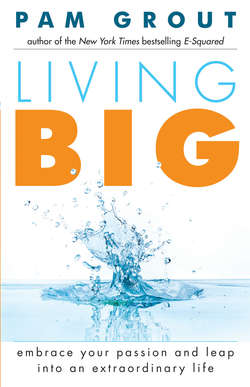Читать книгу Living Big - Пэм Гроут - Страница 18
На сайте Литреса книга снята с продажи.
CHAPTER 1 Thinking Big: The Attitude of Boldness
ОглавлениеNOT TO DREAM MORE BOLDLY MAY TURN OUT TO BE, IN VIEW OF PRESENT REALITIES, SIMPLY IRRESPONSIBLE.
—George Leonard
When you were five, you knew you were the Queen of Sheba. There was no doubt in your mind that you were going to do big things, that your life was important. You paraded around like the gallant human being that you are, driving your parents crazy with your “Mommy, mommy, look at me's.”
Unfortunately, at some point between the ages of seven and thirteen, most of us shut down and decide to go shopping.
Living Big means regaining that five-year-old audacity. It means finding the gall to stand up and say, “Hey, over here.” You've got to be bold in your actions. Outrageous in your dreams. And to remember that you are capable of anything. Believing anything else is denying who you are.
Some might protest that boldness is impudent, that being modest is the attribute to strive for. But modesty is nothing but a learned affectation.
Robert Fulghum's now-famous essay, All I Really Need to Know I Learned in Kindergarten, was recently made into a stage play. In one of the first scenes, the kindergarten teacher asks her fresh young students how many of them are dancers:
“I am. I am,” they all shout exuberantly.
“And how many of you are singers?” she continues.
Again, all of them wave their hands wildly.
“Painters?”
Unanimous hand-waving.
“Writers?
More unanimous hand-waving.
In fourth grade, another teacher asks the same questions of the same students. Now, only a third of the students are dancers, singers, painters, writers. By high school, the number who are willing to claim artistic talent is down to a paltry handful. Where did the confidence and enthusiasm go?
Some well-meaning parent or teacher probably told them they were not painters. Some aptitude test with a fancy title gave an official score that said they had better give up that misguided ambition of being a writer. Try accounting. Some guidance counselor broke the news that only a chosen few have artistic talent.
Very early on, we turn over the reins to something outside ourselves. The coach tells us if we're good enough to be on the basketball team. The music teacher tells us if we have the talent to sing in the choir. Our teachers give us arbitrary grades that tell us if we're smart enough to make the honor role, bright enough to get into college.
Our art teachers give us the rules: Grass is green, skies are blue. Why did we listen? How can anybody else know what color your grass is? How can anybody else know what notes you're supposed to sing? They know what's right for them. But they haven't a clue what is right for you.
Only you know that. And you do know. You don't need another workshop, another book, another psychic reading.
By stepping forward—even when you're not sure you're ready—you'll find genius, power, and magic. Your way will become clear. Oftentimes, we're foggy about our purpose, not quite sure what we want, and it's only because we've been too timid to stick our necks out.
When we're bold, when we challenge the status quo—both in ourselves and in others—the answers to all our questions will gallop in on charging stallions.
Being bold is a simple matter of claiming your inheritance. Saying, “Hey look what I can do!” is simple acknowledgment of who you are.
I am not great because I am Pam Grout, an author, a tennis player, a 5 foot 10 inch mother from Kansas. I am great because I am a human being, part of a proud and noble tribe that includes Gandhi, Shakespeare, and Martin Luther King, Jr. The same heartbeat that pulsed through Picasso and Thomas Edison pulses through me.
Any one of us can be anything we're bold enough to claim. It's why we see quadriplegics painting beautiful pictures, brushes clenched between their teeth. It's why we see blind people snow-boarding down mountains. The only thing that holds any of us back is ourselves. Opportunities clamor from every side. But many of us are too fainthearted to see the possibilities.
When we refuse to be bold, when we forget to say, “I count,” we might as well hand in our keys. Without boldness, life is little but rote recitation.
When Walt Disney was in grade school, a well-meaning teacher, peering over at the flowers he was scribbling in the margins of his paper, tapped him on the shoulder and said, “Walt, honey, those flowers are nice, but flowers don't have faces.”
Walt turned around, looked her straight in the eye and pronounced boldly, “Mine do.”
This is the boldness with which we must live. We must refuse to listen to anything or anybody except the inner urgings of our soul.
As for Walt Disney, well, his flowers certainly did have faces. In Alice in Wonderland, his eighteenth animated feature, the flowers not only had faces, but they had voices, opinions, and a chorus that entertained Alice with the whimsical song, “All in the Golden Afternoon.”
